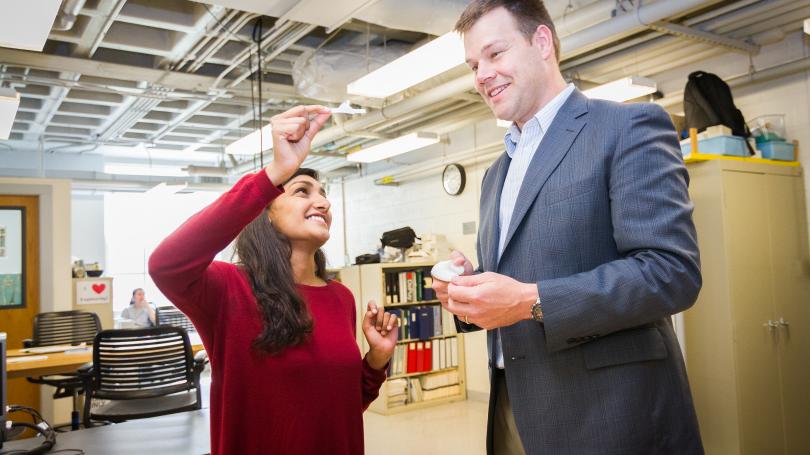
Nivedita Nagaraj '16, left, spent four years working in the Dartmouth Biomedical Engineering Center with Assistant Professor of Engineering Douglas Van Citters, '99, Thayer '06. Photo by Josh Renaud '17, Web Services Student Content Corps.
When she first starting working in the Dartmouth Biomedical Engineering Center (DBEC) as a first-year student, Nivedita Nagaraj '16 never expected that studying knee and hip replacements would become such an important part of her undergraduate experience.
Nagaraj started her work with DBEC as part of a first-year research internship through the Women in Science Project (WISP). Eventually, her work studying the materials used in knee and hip replacements became her senior thesis project.
As a first-year WISP intern, the biomedical engineering major from Rochester Hills, Mich., helped develop a protocol to analyze wear on polyethylene, a material commonly used in hip replacement liners. Over the years, Nagaraj's research expanded to include an analysis of the effects of artificial aging on the material's oxidation and an exploration of the interactions between the body and prosthetic materials. Her senior thesis focused specifically on in vivo oxidation pathways of polyethylene.
Nagaraj, who was awarded both a Sophomore Science Scholarship and a James O. Freedman Presidential Scholarship during her time at the College, worked under the guidance of Douglas Van Citters '99, Thayer '06, an assistant professor of engineering at Thayer School of Engineering. "Professor Van Citters has been a great resource in terms of my research, and also academically and in terms of my career," says Nagaraj. Barbara Currier, a DBEC research engineer and an expert on polyethylene oxidation, also served as a mentor to Nagaraj during her senior thesis work.
"Nivi's work in our lab is a perfect example of how Dartmouth undergraduates can 'get their hands dirty' starting in their first year, and grow their research career to enable meaningful contributions not just to a laboratory, but to an entire field of science," says Van Citters. "Nivi's work supports a major research effort in my lab that is funded by the U.S. Food and Drug Administration. As evidenced by her recent second place award in the Christopher Reed Science Competition, Nivi's command of the science is outstanding, and we have every intent of submitting her work for publication over the summer."
Nagaraj had never done research before college, and WISP provided a structure for her to connect with faculty and get a research internship. Without WISP, "It would've taken me a lot more time to get involved in research," Nagaraj says. "I started WISP research my freshman winter, so I really hit the ground running." The WISP mentorship program also connected her with a biomedical engineering major from the Class of 2015, who helped her navigate the complexities of life as a STEM student at Dartmouth.
Nagaraj says that her work in her WISP internship and in her research career in general have taught her a process of logical analytical thinking that is applicable across disciplines and in real life. "The inherent value of WISP is that when faculty members take on WISP interns, it's to teach them and give them the skills to conduct their own project, rather than to just train them to be an assistant," says Nagaraj. She also appreciates WISP's programming. "I've been to many WISP panels and just recently I went to the WISP 25th anniversary dinner, which was a phenomenal experience. I got to meet so many females that have successful careers in science, finance, and the humanities."
Outside of the lab and classroom, Nagaraj was involved in a number of extracurriculars. She was a member of Kappa Kappa Gamma sorority and worked as a teaching assistant for "Organic Chemistry II" and "Introduction to Scientific Computing." She volunteered at Dartmouth-Hitchcock Medical Center as a medical specialties volunteer and as a baby cuddler. A dancer since the fourth grade, she was the president of Dartmouth Raaz, the South Asian fusion dance team, since her sophomore spring.
Now that her time at Dartmouth has come to a close, Nagaraj looks to the future. "I came to college thinking engineering or medicine, like those were my only two options," she says. But after interning in health care consulting, she realized she enjoyed the combination of strategy and science, as well as the immediate impact of consulting. Nagaraj plans on taking a gap year to work in health care consulting, with the ultimate goal of going back to school for an MD or an MD/MBA.
The Women in Science Project was co-founded in 1990 by Carol Muller '77, former associate dean for administration at Dartmouth's Thayer School of Engineering, and the late Karen E. Wetterhahn, professor of chemistry and associate dean for the sciences. The program helps create an environment where women can thrive in science, technology, engineering, and mathematics. The program, which is celebrating its 25th anniversary this year, has received numerous accolades and is replicated on college campuses nationwide.
The Web Services Student Content Corps is an experiential learning program designed to give students professional work experience in digital content creation. Content Corps members work under the guidance of the Web Services team to produce content for department and program websites.